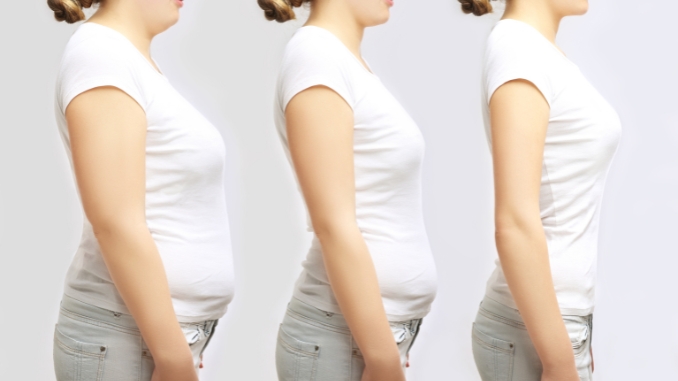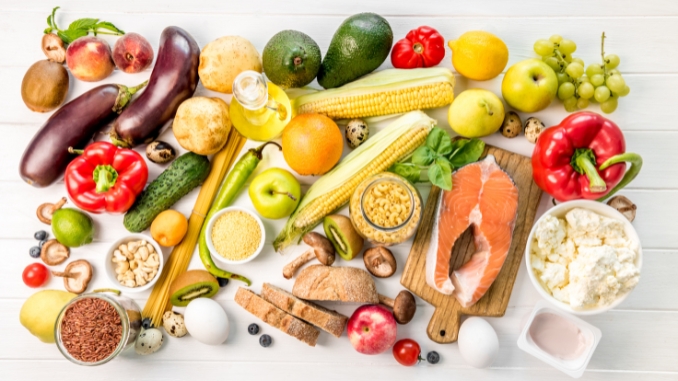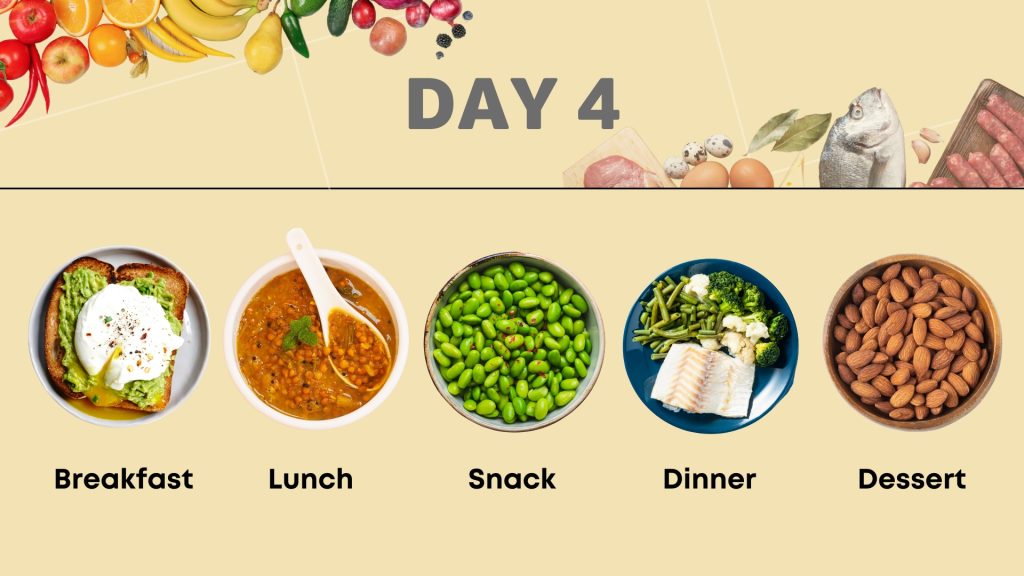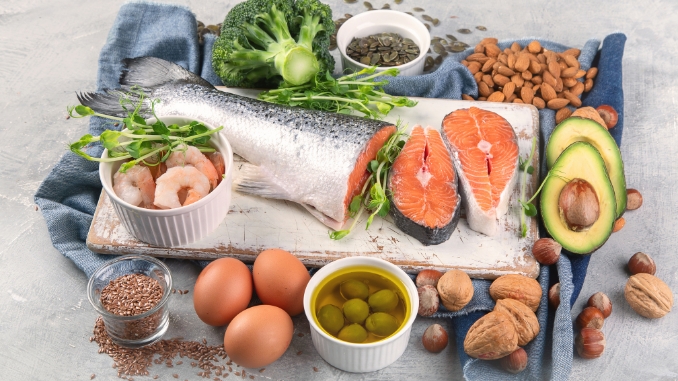Menopause Weight Loss: 5-Day Diet Plan

Last updated on November 7th, 2025 at 02:40 pm
As we get older, we experience changes in our body [1] composition, including our weight.
As stated by the National Library of Medicine [2] in 2021, women typically gain about one pound annually on average during the menopausal transition.
However, the amount of weight gained can vary significantly, with 20% of women gaining 10 pounds or more during this period. And many women find it hard to shed those extra pounds during this phase of life.
But fear not—we have the solution for you—a diet plan specifically designed to address women's unique challenges during menopause and help you reach your weight loss goals. Don't let menopause stop you from achieving your desired weight.
Start the menopause diet, 5-day plan to lose weight.
Disclaimer: This information is for educational purposes only and is not medical advice. Individual results may vary. Weight gain during menopause can differ widely due to hormonal changes, metabolism, and lifestyle. It is recommended to consult a healthcare professional before starting any new diet plan. This guide aims to assist with weight management but does not guarantee specific results. Personalized advice from qualified professionals is essential.
Understanding Menopause and Weight Gain
Menopause is a natural biological process [3] that signifies the end of a woman's menstrual cycle. It typically occurs between the ages of 45 and 55 years for most women worldwide.
During menopause, the ovaries gradually produce fewer hormones [4], particularly progesterone and estrogen, leading to various physical and emotional changes. Managing menopause symptoms through a healthy lifestyle and diet is crucial for menopausal women.
Incorporating a healthy diet and maintaining a healthy lifestyle can help alleviate menopause symptoms and support overall well-being. One common consideration for many women during menopause is weight gain.
Several factors contribute to menopause weight gain, including:
1. Hormonal Changes
During menopause, declining estrogen levels can alter fat distribution, increasing abdominal fat. This shift not only impacts appearance but also raises the danger of cardiovascular disease and other health issues.
It indicates the significance of adopting healthy habits, such as regular exercise and a balanced diet, to manage weight and also reduce associated health risks.
2. Metabolic Changes
As people age, their metabolism slows down. This results in a greater ease of weight gain and a more difficult process for shedding pounds.
This effect is intensified during menopause due to a drop in estrogen levels, which affects how the body metabolizes and stores fat. Lower estrogen levels can lead to decreased calorie burning and increased fat storage [5] around the abdomen.
These metabolic changes can add to weight gain and make maintaining a healthy weight more challenging during menopause.
3. Muscle Loss

Age-related muscle loss, medically termed sarcopenia, is a common concern during menopause [6], particularly if physical activity levels decline. Sarcopenia refers to the incremental loss of strength and muscle mass that occurs as people age.
This decline in muscle mass is significant because muscle tissue is metabolically active, meaning it burns more calories than fat, even at rest. Therefore, a reduction in muscle mass can decrease overall calorie expenditure, making weight management more challenging.
Additionally, decreased muscle mass can also result in a decline in physical function and mobility, further impacting overall health and quality of life during menopause.
4. Lifestyle Factors
Changes in lifestyle habits play a significant role [7] in weight gain during menopause. Factors such as decreased physical activity and poorer dietary choices can contribute to this.
With the onset of menopause, many women also experience increased stress, which can lead to emotional eating or reliance on other unhealthy coping mechanisms.
5. Sleep Disruptions
Menopausal symptoms, night sweats, and hot flashes can seriously disrupt sleep patterns, causing fatigue and decreased energy levels during the day. Sleep disturbances are common [8] during menopause. Many women experience problems falling asleep or staying asleep due to these symptoms.
The resulting poor sleep quality not only affects daily functioning but can also have long-term implications for weight management. Research suggests inadequate sleep [9] is associated with weight gain and difficulty maintaining a healthy weight.
This may be attributed to alterations in hunger hormones, increased appetite, and cravings for high-calorie foods, as well as decreased energy spending due to fatigue.
The Importance of a Balanced Diet During Menopause
Maintaining a balanced diet during menopause supports overall health and well-being. The hormonal changes that occur during menopause can increase the risk of certain health conditions and exacerbate symptoms such as mood swings, hot flashes, and weight gain.
A balanced diet can help regulate these symptoms and also reduce the risk of chronic diseases.
Here are several reasons why a balanced diet is important during menopause:
1. Nutrient Intake

As women age, their nutrient needs may change.
A balanced diet provides essential nutrients such as calcium, vitamin D, magnesium, and potassium, which are important for bone health, muscle function, and overall vitality.
Adequate intake of these nutrients can help prevent osteoporosis and also maintain muscle mass.
2. Hormonal Balance
Certain nutrients, such as phytoestrogens found in soy products, flaxseeds, and legumes, may help balance hormone levels in the body.
By exerting weak estrogenic effects, phytoestrogens have been shown to relieve menopausal symptoms such as night sweats and hot flashes.
3. Weight Management
A balanced diet can help manage weight gain, common during menopause due to hormonal changes, metabolic changes, and lifestyle factors.
Emphasizing whole foods such as lean proteins, vegetables, healthy fats, fruits, and while limiting processed foods and added sugars can support weight management efforts.
4. Heart Health

During menopause, the reduction of estrogen, which serves a protective function for cardiovascular health, occurs, increasing the risk of heart disease.
A balanced diet that is low in bad fats and high in fiber, antioxidants, and omega-3 fatty acids can help reduce the danger of heart disease by cholesterol levels, lowering blood pressure, and nflammation.
5. Regulate Blood Sugar Levels
Fluctuations in hormone levels during menopause can affect insulin sensitivity and blood sugar regulation, increasing the risk of type 2 diabetes.
A balanced diet rich in complex carbs, protein, and fiber can help reduce the developing diabetes risk and stabilize blood sugar levels.
6. Gut Health

Menopause-related hormonal changes can affect digestion and gut health. A well-rounded, balanced diet that includes prebiotics, probiotics, and fiber-rich foods can promote digestive health, support regulate bowel movements and a healthy gut microbiome.
7. Energy Levels
Nutrient-dense foods provide sustained energy levels and support overall vitality during menopause. Eating regular snacks and balanced meals can also help avoid energy crashes and fatigue.
8. Mood and Mental Health
Nutrient deficiencies and imbalances can impact mood and mental health. Consuming a balanced diet rich in vitamins, omega-3 fatty acids, and minerals can support brain function, reduce stress, and improve mood stability during menopause.
By following a balanced diet, you can optimize your nutrition intake, support your weight loss goals, and manage the symptoms associated with menopause.
The 5-Day Menopause Diet Plan to Lose Weight
To help you get started on your menopause weight loss journey, here's a 5-day menopause diet meal plan to lose weight that incorporates the key dietary recommendations mentioned earlier:
Day 1

- Breakfast: Greek yogurt served with mixed berries and a sprinkle of nuts.
- Lunch: Grilled chicken salad with assorted greens, cherry tomatoes, cucumber, and a light vinaigrette dressing.
- Snack: Carrot sticks with hummus.
- Dinner: Baked salmon with roasted vegetables (broccoli, cauliflower, and carrots).
- Dessert: A small piece of dark chocolate.
Day 2

- Breakfast: Oatmeal topped with banana slices and a drizzle of honey.
- Lunch: Quinoa salad with grilled vegetables (bell peppers, eggplant, and zucchini) and feta cheese.
- Snack: Apple slices with almond butter.
- Dinner: Roasted shrimp skewers with a side of steamed asparagus.
- Dessert: A bowl of mixed berries.
Day 3

- Breakfast: Veggie omelet made with spinach, bell peppers, and onions.
- Lunch: Whole grain wrap with grilled chicken, avocado, lettuce, and tomato.
- Snack: Greek yogurt with a sprinkle of granola.
- Dinner: Stir-fried tofu with mixed vegetables (broccoli, snow peas, and carrots) served over brown rice.
- Dessert: A small bowl of frozen yogurt.
Day 4

- Breakfast: Whole wheat toast topped with smashed avocado and a poached egg.
- Lunch: Lentil soup and a side of mixed green salad.
- Snack: Edamame beans.
- Dinner: Baked cod with quinoa and steamed green beans.
- Dessert: A handful of almonds.
Day 5

- Breakfast: Protein smoothie made with spinach, banana, almond milk, and a scoop of protein powder.
- Lunch: Grilled vegetable and goat cheese wrap.
- Snack: Sliced bell peppers with guacamole.
- Dinner: Whole wheat pasta topped with turkey meatballs and marinara sauce.
- Dessert: A bowl of sliced melon.
Remember to tailor the serving sizes to suit your personal health requirements and seek advice from a dietitian or a healthcare provider prior to embarking on a new dietary regimen.
Essential Nutrients for Losing Weight
When focusing on weight loss during menopause, it's important to prioritize essential nutrients that support overall health and promote a healthy metabolism. Here are some essential nutrients to include:
1. Protein

Protein is important in maintaining muscle mass, which can decline with age and hormonal changes during menopause. Add lean protein sources, such as poultry, fish, tofu, beans, lentils, eggs, and Greek yogurt, to support muscle retention and promote feelings of fullness.
2. Calcium
Adequate calcium intake is important for women during menopause to support bone health. Additionally, some studies suggest that calcium-rich foods may help with weight loss by decreasing fat absorption and increasing fat breakdown.
3. Vitamin D
Vitamin D is essential in menopause diet 5-day plan to lose weight and is pivotal for bone health and calcium absorption. It may also be crucial in weight management, as low vitamin D levels have been associated with weight gain.
4. Omega-3 Fatty Acids

Omega-3 fatty acids, found in fatty fish, flaxseeds, and walnuts, have anti-inflammatory properties and may help reduce menopausal symptoms. They can also support weight loss by reducing inflammation and improving insulin sensitivity.
5. Fiber
Adequate fiber intake is vital for digestive health and weight management. Fiber-rich foods help you feel full longer, control blood sugar, and maintain regular bowel movements. Incorporating fruits, vegetables, whole grains, legumes, nuts, and seeds into your diet ensures you receive these benefits, supporting overall wellness and effective weight management.
6. Phytoestrogens
Phytoestrogens are plant compounds that have an identical structure to estrogen. They can help manage menopausal symptoms and support weight loss efforts. Foods rich in phytoestrogens include flaxseeds, soy products, and whole grains.
Including these nutrients in your diet can help support weight loss and overall health during menopause.
Recipes and Meal Ideas for the Menopause Diet
Here are some recipe ideas to inspire your 5 day menopause diet 5 plan to lose weight:
1. Salmon Salad with Avocado Dressing

- Grilled or baked salmon fillet over a bed of mixed greens (spinach, arugula, kale).
- Top with sliced avocado, cherry tomatoes, cucumber, and sliced almonds.
- Drizzle with a homemade avocado dressing made from mashed avocado, lemon juice, olive oil, garlic, salt, and pepper.
2. Quinoa-Stuffed Bell Peppers
- Cooked quinoa, and mixed with black beans, corn, diced bell peppers, onions, and cilantro.
- Stuff the mixture into halved bell peppers and bake until tender.
- Serve with Greek yogurt and shredded cheese on top.
3. Tofu and Vegetable Stir Fry

- Cubed tofu stir-fried with mixed vegetables (bell peppers, broccoli, snap peas, carrots) in a sesame-ginger sauce.
- Serve over quinoa or brown rice and garnish with sliced green onions and sesame seeds.
4. Greek Yogurt Parfait
- Layer the Greek yogurt with fresh berries (strawberries, blueberries, raspberries), granola, and a drizzle of honey or maple syrup.
- Optional: add a sprinkle of chia seeds or chopped nuts for extra crunch and nutrition.
5. Mediterranean Chickpea Salad
- Mix cooked chickpeas with diced cucumbers, tomatoes, red onions, Kalamata olives, and feta cheese.
- Toss with olive oil, lemon juice, garlic, oregano, salt, and pepper.
- Serve chilled as a refreshing and protein-rich salad.
6. Vegetable and Lentil Soup

- Sauté onions, garlic, carrots, celery, and bell peppers in olive oil until softened.
- Add vegetable broth, canned diced tomatoes, cooked lentils, and your choice of spices (such as cumin, paprika, and thyme).
- Simmer until flavors meld together, then serve hot with a sprinkle of fresh parsley on top.
7. Green Smoothie
- Blend together spinach, kale, banana, frozen berries, almond milk, and Greek yogurt until creamy and smooth.
- (Optional) add chia seeds or protein powder for extra fiber and protein.
8. Turkey and Veggie Lettuce Wraps

- Cook ground turkey with onions, garlic, and diced vegetables (such as carrots, bell peppers, and mushrooms) in a skillet.
- Spoon the mixture onto large lettuce leaves (such as romaine or butter lettuce) and top with sliced avocado and salsa.
These recipes are not only delicious but also packed with nutrients that can boost overall health and well-being during menopause. Feel free to adjust the seasonings and ingredients based on your dietary needs and preferences.
Incorporating Exercise Into Your Menopause Weight Loss Plan
Along with a menopause diet 5 day plan to lose weight, regular physical activity is essential for weight management during menopause. Exercises burn calories and support overall health and well-being.
Here are some tips for incorporating exercise into your menopause weight loss plan:
1. Find activities you enjoy

Choose activities whether indoor or outdoor that you genuinely enjoy, like brisk walking, swimming, dancing, or yoga. Participating in exercises you enjoy boosts the chances of maintaining a consistent workout regimen.
2. Strive for a mix of strength training and cardiovascular exercises
Incorporate both cardiovascular exercises, like cycling, walking, and strength training exercises. Cardiovascular exercises burn calories and improve cardiovascular health, while strength training exercises help build lean muscle mass, which can boost metabolism.
3. Schedule regular exercise sessions
Set aside specific times in your week for exercise and treat them as non-negotiable appointments. Strive to achieve a minimum of 75 minutes of high-intensity aerobic workouts or 150 minutes of moderate aerobic exercises each week and two or more days of strength training exercises.
4. Listen to your body

Pay attention to how your body feels during and after exercise. If you experience any pain or discomfort, modify or decrease the intensity of your workout. Finding a balance between respecting your body's limits and pushing yourself is important.
5. Stay consistent
Make it a habit to include physical activity in your everyday routine. Keep in mind that even small bouts of exercise can add up over time.
Remember to talk with your healthcare professional before starting a new exercise routine, especially if you have any underlying health conditions.
Lifestyle Changes to Achieve Weight Loss Goals
In addition to following a balanced diet and exercising regularly during menopause, adopting certain lifestyle modifications can assist in supporting your weight loss goals.
Here are a few suggestions:
- Get enough sleep: Aim for 7 to 9 hours of quality sleep per night. Sleep is important in weight management, as lack of sleep can upset hunger hormones and increase appetite and also cravings.
- Manage stress: Menopause can bring about various physical and emotional changes, and stress can exacerbate these symptoms. Find a healthy approach to manage stress, such as practicing mindfulness, deep breathing exercises, or engaging in hobbies that bring you joy.
- Stay hydrated: Adequate hydration is essential for overall health and weight management. Water, specifically, can help curb appetite, support digestion, and boost metabolism.
- Limit alcohol and caffeine: Excessive alcohol and caffeine consumption can also disrupt sleep patterns, increase hot flashes, and contribute to weight gain. Moderation is key when it comes to these beverages.
- Prioritize self-care: Make time for self-care activities that promote relaxation and well-being, such as taking a warm bath, practicing meditation, or spending time in nature. Prioritizing self-care can help reduce stress and support your weight loss journey.
Remember that everyone's journey is unique. It's important to listen to your body and make choices that align with your needs and preferences.
Common Challenges and How to Overcome Them
While following the menopause diet and incorporating lifestyle changes can be beneficial for weight loss during menopause, it's important to acknowledge and address common challenges that may arise. Here are some typical challenges and strategies to overcome them:
- Food cravings: Menopause hormonal changes can increase cravings, especially for sugary or high-fat foods. To overcome food cravings, try to identify triggers, practice mindful eating, and keep healthy snacks readily available.
- Lack of motivation: It's natural to experience periods of low motivation during your weight loss journey. To stay motivated, set realistic goals, track your progress, celebrate small victories, and find a support system to hold you accountable.
- Plateaus: Weight loss plateaus are common and can also be frustrating. If you reach a plateau, try adjusting your calorie intake, increasing the intensity or duration of your workouts, or incorporating new exercises to challenge your body.
- Emotional eating: Menopause can bring about mood swings and emotional changes, which can lead to emotional eating. Find alternative ways to cope with emotions, such as engaging in hobbies, practicing relaxation techniques, or seeking support from a therapist or counselor.
- Body image concerns: Menopause can also bring about changes in body composition, which may affect body image. Focus on the positive changes you're making for your health rather than solely focusing on weight loss. Celebrate non-scale victories like increased energy levels, improved strength, and better sleep.
Remember that everyone's weight loss journey is unique, and it's important to be patient and kind to yourself throughout the process.
Summary
Weight gain during menopause is a common concern for many women due to hormonal changes, metabolic shifts, and lifestyle factors. However, by adopting a balanced diet rich in essential nutrients such as calcium, vitamin D, omega-3 fatty acids, fiber, and phytoestrogens, women can support their overall health and potentially mitigate weight gain during this transitional phase of life.
Additionally, incorporating regular physical activity, managing stress levels, prioritizing sleep, and seeking support from healthcare professionals or registered dietitians can further enhance weight management efforts during menopause. By focusing on holistic approaches to health and wellness, women can navigate menopause more easily and maintain a healthy weight while promoting overall well-being.
You have more control over your hormones than you think! Check out this 14-Day Hormone Balancing Quick Start Program now!
Rick Kaselj MS, is a leading kinesiologist and injury specialist as well as co-creator of the best-selling Unlock Your Hip Flexors program. Rick creates exercise programs that help people heal injuries and eliminate pain, so they can go back to living a full, active, healthy life.






